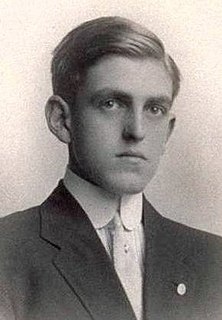A Quote by Ralph Waldo Emerson
Good is positive. Evil is merely privative, not absolute: it is like cold, which is the privation of heat. All evil is so much death or nonentity. Benevolence is absolute and real. So much benevolence as a man hath, so much life hath he.
Related Quotes
In this world, there is no absolute good, no absolute evil," the man said. "Good and evil are not fixed, stable entities, but are continually trading places. A good may be transformed into an evil in the next second. And vice versa. Such was the way of the world that Dostoevsky depicted in The Brothers Karamazov. The most important thing is to maintain the balance between the constantly moving good and evil. If you lean too much in either direction, it becomes difficult to maintain actual morals. Indeed, balance itself is the good.
Evil denotes the lack of good. Not every absence of good is an evil, for absence may be taken either in a purely negative or in aprivative sense. Mere negation does not display the character of evil, otherwise nonexistents would be evil and moreover, a thing would be evil for not possessing the goodness of something else, which would mean that man is bad for not having the strength of a lion or the speed of a wild goat. But what is evil is privation; in this sense blindness means the privation of sight.
Evil does not exist sir, or at least it does not exist unto itself. Evil is simply the absence of God. It is just like darkness and cold, a word that man has created to describe the absence of God. God did not create evil. Evil is not like faith, or love that exist just as does light and heat. Evil is the result of what happens when man does not have God's love present in his heart. It's like the cold that comes when there is no heat or the darkness that comes when there is no light.
If there is no absolute moral standard, then one cannot say in a final sense that anything is right or wrong. By absolute we mean that which always applies, that which provides a final or ultimate standard. There must be an absolute if there are to be morals, and there must be an absolute if there are to be real values. If there is no absolute beyond man's ideas, then there is no final appeal to judge between individuals and groups whose moral judgments conflict. We are merely left with conflicting opinions.
If thou desire not to be poor, desire not to be too rich. He is rich, not that possesses much, but he that covets no more; and he is poor, not that enjoys little, but he that wants too much. The contented mind wants nothing which it hath not; the covetous mind wants, not only what it hath not, but likewise what it hath.
It [the Civil War] was a heroic struggle; and, as is inevitable with all such struggles, it had also a dark and terrible side. Very much was done of good, and much also of evil; and, as was inevitable in such a period of revolution, often the same man did both good and evil. For our great good fortune as a nation, we, the people of the United States as a whole, can now afford to forget the evil, or, at least, to remember it without bitterness, and to fix our eyes with pride only on the good that was accomplished.
In the story of the Creation we read: ". . . And behold, it was very good." But, in the passage where Moses reproves Israel, the verse says: "See, I have set before thee this day life and good, and death and evil." Where did the evil come from? Evil too is good. It is the lowest rung of perfect goodness. If you do good deeds, even evil will become good; but if you sin, evil will really become evil.








































